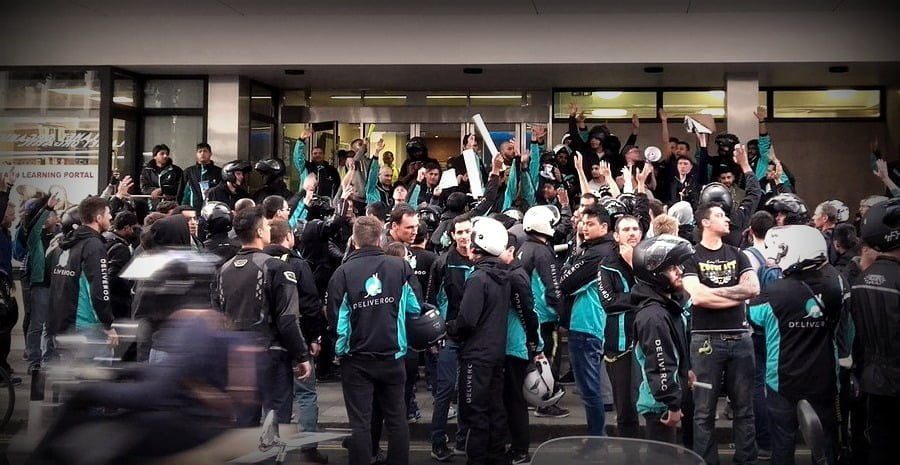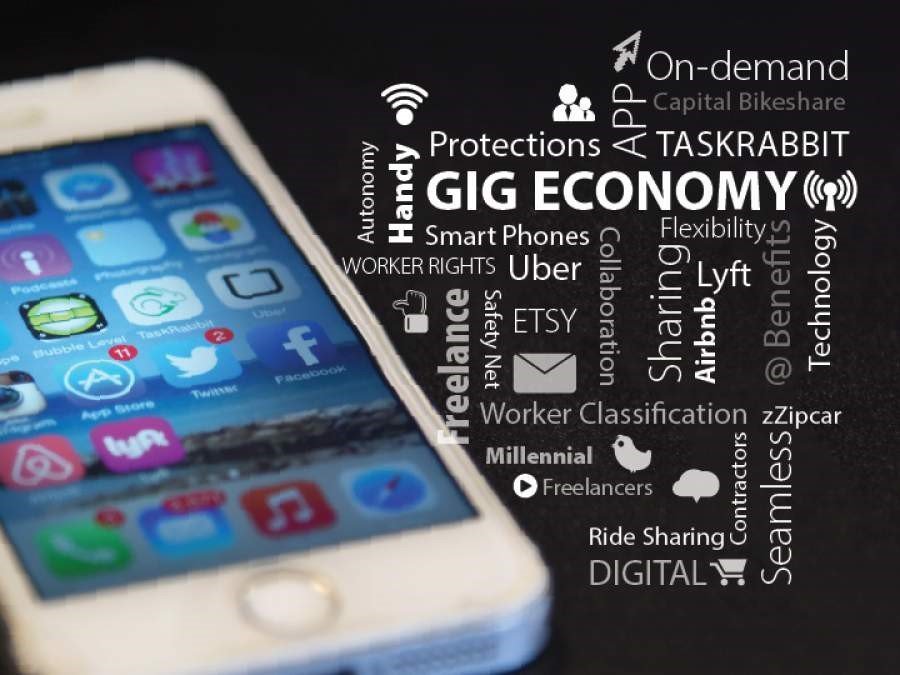On 28th October, two Uber drivers heard and won their court case against their exploitative employer, winning the right for them and their fellow “gig” workers to be granted employee status and accompanying workers’ rights. Thomas Soud takes a look at the gig economy and the militant methods needed to end exploitation.
In front of big square boxes, blinded by flashing lights and slowly dialling up to a new network known as the World Wide Web, a group of young wide-eyed entrepreneurs had an idea. With the two tonne machines that currently lay crushing their desks, they could create a new version of capitalism; an economic ecology freed from the robber barons and satanic mills of old, where free, rational individuals, guided by the digital hand of the market, could be united to create new riches for themselves and all of society in the process. This was the silicon dream.
Nearly 30 years on from this initial daydreaming and we find that this new reality, for many, has become more of a nightmare. Rather than calibrating and equalising the desires, preferences and rationales of free human beings, the apps, internet and computers at society’s fingertips have simply become yet another tool for the exploitation of the working class. Airbnb, Deliveroo, and Uber are but three of the new household names in this latest tech wave known as the “gig economy”.
The myth of the micro-entrepreneur
In essence, this new digital ‘paradise’ is no different from the old satanic mills. Their meteoric rise is a graphic display of capitalism’s need to grind down workers’ rights, increase the working day, and lower workers’ wages – all in the name of profit. The move to “gigs” – with an army of precariously-employed workers forced to compete in a race to the bottom for small scraps of work and pay – has allowed the bourgeois vultures to achieve this historic task in new forms. Rather than give people decent wages and conditions fit for human beings, the capitalists now skirt round the gains won through struggle by previous generations, claiming that they are not required to provide such luxuries to these gig workers. Uber, Deliveroo, etc. – so we are told by the bosses – are apparently not companies, but “platforms”. The workers in the gig economy, therefore, are in fact the entrepreneurs – “micro-capitalists” controlling their own mini-businesses via the generosity of corporate multinationals.
Yet what capitalist earns £5 per hour? What entrepreneur lacks all but the measliest amount of capital, so that all they can offer is a single cab ride? What business-owner has no employees and must routinely work long past the point that all regulations prohibit, and (to add insult to injury) has all this decided by those who control their income?!
Such conditions are not that of the boss, but the worker. This is not the hard work of the Protestant Ethic, but blatant, brutal and illegal exploitation. We do not see progress in such a system, but simply a rehashing of the same crimes that have haunted humanity since the inception of capitalism.
A blow to the bosses
Yet workers have never taken such attacks lying down, and will not start to today simply because their bosses sit at a keyboard rather than in industrial factories.
Recently, on 28th October, two brave Uber drivers – backed by the GMB union – said enough is enough, taking the international corporate giant to court and securing a monumental victory. No longer would the pretence of a self-employed micro-entrepreneur be allowed to be maintained; instead, the courts decided that they were employees – members of the working class, entitled to the same rights as all other workers in the UK. It was deemed that Uber must provide the minimum wage, holiday pay, and pensions, and stop trampling over workers’ rights.
This decision immediately sent convulsive fits round the headquarters of the leading companies of the gig economy – since what applies to Uber will undoubtedly apply throughout all similar organisations. The legal requirements this precedent sets now place the profits and futures of these corporate monstrosities under existential threat; they will not, therefore, accept this setback lightly.
Uber has already appealed the decision and sent out a pack of lies to all of its “partners” (a.k.a. “employees”) that this will only affect the two drivers concerned. It frames the debate as one of flexibility vs. bureaucracy. In reality, it is exploitation vs. decency.

Militancy pays
Uber’s strength can appear overbearing, and the fight will not be easy. If these two drivers and others like them are to succeed, then the first task must be to work on unionising and organising those in the gig economy, starting with other Uber drivers. This is no easy task. But the inspiring strikes and victory by Deliveroo drivers recently shows that it can be done; that organisation and militancy do pay.
At the same time, it must be stressed that such struggle is the only genuine defence that workers have in the face of the aggressive rat-race of modern-day capitalist competition. Only by exerting the power and pressure of the organised working class – and not relying upon the benevolence of the courts of the capitalist state – can concessions be won, guaranteed, and maintained.
In replacing relations between worker and worker with username and username, we see how technology designed to bring the whole world closer together is in fact used to isolate and divide the working class even further. Many in the gig economy may never see a fellow colleague in the entire time of their employment; indeed, they are instead placed in direct competition with each other, with the only winner being the corporation and its profits.
The extremity of these conditions demonstrates the need to get organised. Failing to do so will only result in continued exploitation, as more and more malevolent routes are devised in order to exploit workers. On the other hand, successes and victories could cause shock waves throughout the gig economy and the labour movement as a whole, showing that if unions can take hold in this most-precarious of industries, it can – and must – happen everywhere.
End exploitation! End capitalism!
Ultimately, however, even such industrial struggles cannot secure a decent long-term future for ordinary men and women. The ruling class will strike back with a vengeance and seek to strip away all the hard-won gains of the past for the sake of their profits.
If we desire a world without exploitation – without long working hours, low pay, and vicious attacks on our basic rights – then the only solution is to abolish the inherently exploitative capitalist system; to instead plan production on a socialist basis for use rather than exchange, with democratic workers’ control of the workplace and the whole economy.
Solidarity with Uber drivers! You have nothing to lose but your chains! There is a world to win!






